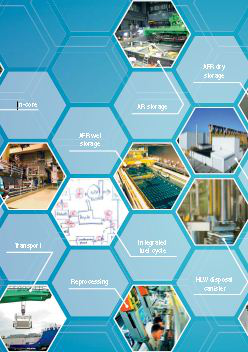Speaker
Dr
Jeong Hun Cha
(Korea Institute of Nuclear Safety(KINS))
Description
It is expected that amount of nuclear spent fuels will exceed the capacity of temporary storage tanks in each nuclear power plant in Korea after several years. Accordingly, the industry demand for storage cask commercialization has been increased. According to the demand, KINS(Korea Institute of Nuclear Safety) started to develop a thermal technical guidelines including CFD analysis as a development of technical guidelines for storage cask licensing. Given the growing industry need to store nuclear spent fuel of increasingly higher burn-ups and heat loads in dry storage casks, a conservative calculation model, for example, a homogenized model, is being substituted for a complex model, for example, rod based model, to secure more thermal margin.
In this study, there were several assumptions that the PWR nuclear fuel assembly model was designed based on a CE-type-16-by-16 PWR nuclear fuel and the fuel assembly was cooled for 10 years in a temporary storage tank, so the decay heat generation of the spent fuel assembly was 938.8 W, and the PWR dry storage cask model was designed based on a commercial cask which loads 24 PWR spent fuel assemblies. To compare the thermal margin between the homogenized model and the rod model, 4 cases CFD model, a 1/4 cask homogenized model, a 1/8 cask rod model, one spent fuel assembly homogenized model and one spent fuel assembly rod based model, were calculated.
Consequently, the comparison of thermal margins between two calculation models was reviewed and valuable physical parameters were collected after this CFD thermal analysis. And it is expected to contribute an establishment of CFD thermal analysis methodology using the complex analysis model.
Country/ int. organization
Korea / Korea Institute of Nuclear Safety
Primary author
Dr
Jeong Hun Cha
(Korea Institute of Nuclear Safety(KINS))
Co-author
Mr
Dae-Sik Yook
(Korea Institute of Nuclear Safety)

